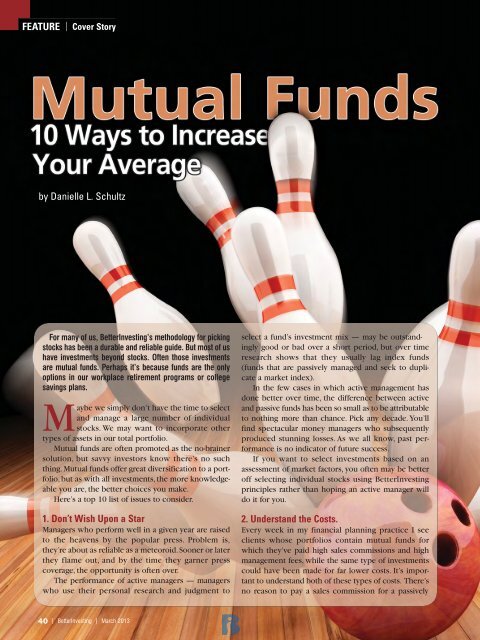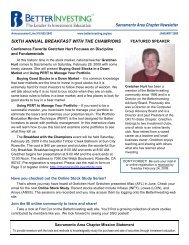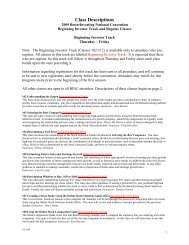STOCK TO STUDY: T. Rowe Price Group, Inc ... - BetterInvesting
STOCK TO STUDY: T. Rowe Price Group, Inc ... - BetterInvesting
STOCK TO STUDY: T. Rowe Price Group, Inc ... - BetterInvesting
Create successful ePaper yourself
Turn your PDF publications into a flip-book with our unique Google optimized e-Paper software.
FEATURE | Cover Story<br />
by Danielle L. Schultz<br />
For many of us, <strong>BetterInvesting</strong>’s method ology for picking<br />
stocks has been a durable and reliable guide. But most of us<br />
have investments beyond stocks. Often those investments<br />
are mutual funds. Perhaps it’s because funds are the only<br />
options in our workplace retirement programs or college<br />
savings plans.<br />
Maybe we simply don’t have the time to select<br />
and manage a large number of individual<br />
stocks. We may want to incorporate other<br />
types of assets in our total portfolio.<br />
Mutual funds are often promoted as the no-brainer<br />
solution, but savvy investors know there’s no such<br />
thing. Mutual funds offer great diversification to a portfolio,<br />
but as with all investments, the more knowledgeable<br />
you are, the better choices you make.<br />
Here’s a top 10 list of issues to consider.<br />
1. Don’t Wish Upon a Star<br />
Managers who perform well in a given year are raised<br />
to the heavens by the popular press. Problem is,<br />
they’re about as reliable as a meteoroid. Sooner or later<br />
they flame out, and by the time they garner press<br />
cover age, the oppor tunity is often over.<br />
The performance of active managers — managers<br />
who use their personal research and judgment to<br />
select a fund’s investment mix — may be outstandingly<br />
good or bad over a short period, but over time<br />
research shows that they usually lag index funds<br />
(funds that are passively managed and seek to duplicate<br />
a market index).<br />
In the few cases in which active management has<br />
done better over time, the difference between active<br />
and passive funds has been so small as to be attributable<br />
to nothing more than chance. Pick any decade. You’ll<br />
find spectacular money managers who subsequently<br />
produced stunning losses. As we all know, past performance<br />
is no indicator of future success.<br />
If you want to select investments based on an<br />
assessment of market factors, you often may be better<br />
off selecting individual stocks using Better Investing<br />
principles rather than hoping an active manager will<br />
do it for you.<br />
2. Understand the Costs.<br />
Every week in my financial planning practice I see<br />
clients whose portfolios contain mutual funds for<br />
which they’ve paid high sales commissions and high<br />
management fees, while the same type of investments<br />
could have been made for far lower costs. It’s important<br />
to understand both of these types of costs. There’s<br />
no reason to pay a sales commission for a passively<br />
40 | <strong>BetterInvesting</strong> | March 2013





